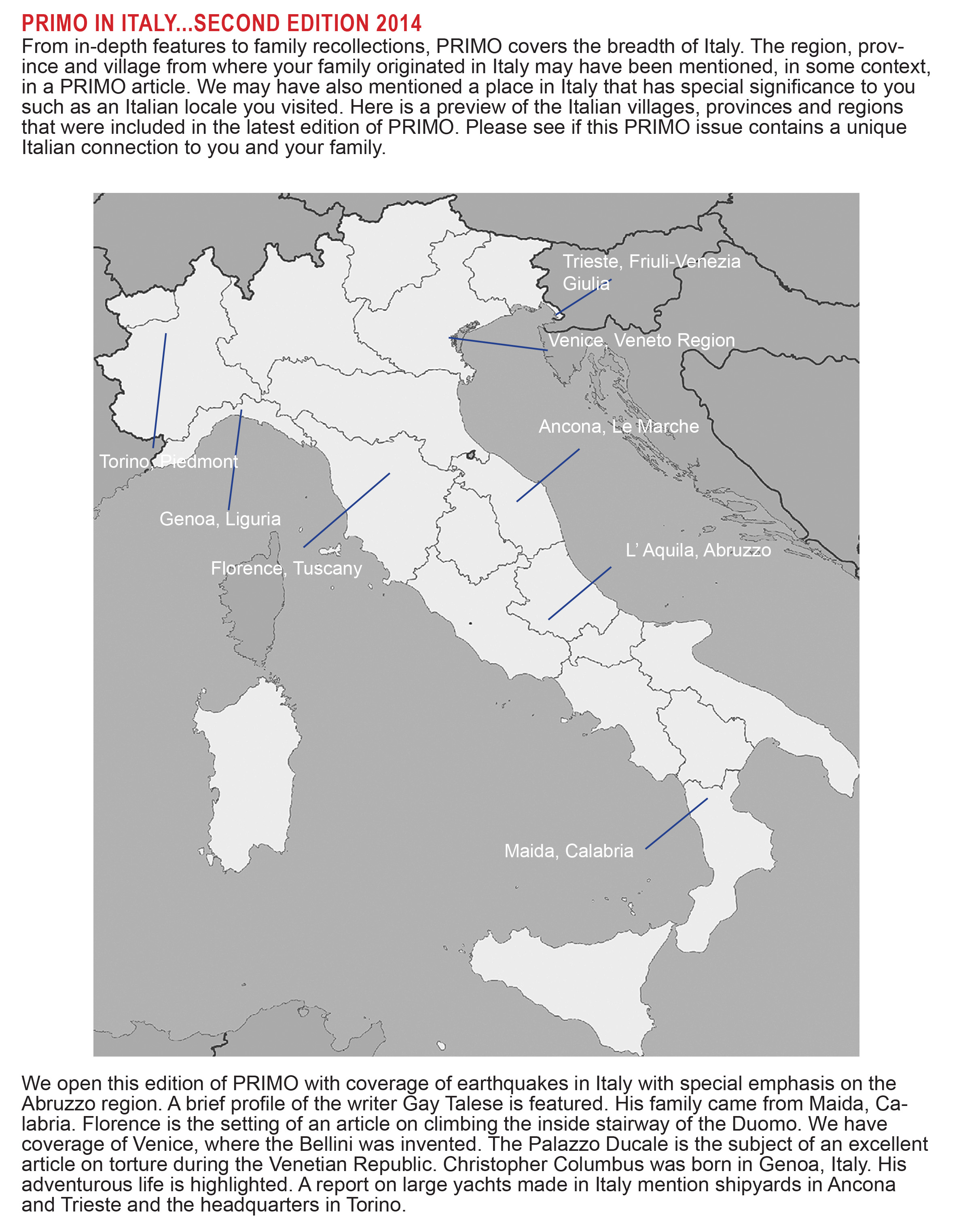 |
||
 |
||
|
News Archives - July 2011 The Latest News…from an Italian American Perspective:
ITALY TURNS LEFT IN LOCAL ELECTIONS AND REFERENDUMS The results were not what Prime Minister Silvio Berlusconi wanted. Italians went to the polls this past May to elect the president and provincial council of nine provinces, i.e., Vercelli, Mantua, Pavia, Treviso, Ravenna, Lucca, Macerata, Campobasso and Reggio Calabria. Voters chose the mayor and the municipal council of 1,177 municipalities including 23 provincial capitals Novara, Turin, Milan, Varese, Rovigo, Savona, Bologna, Ravenna, Rimini, Arezzo, Grosseto, Siena, Fermo, Latina, Benevento, Caserta, Naples, Salerno, Barletta, Catanzaro, Cosenza, Crotone and Reggio Calabria. The election was held in two phases: First, on May 15 and 16, when candidates representing almost a dozen political parties vied for votes. Then a runoff election was held between the two top vote getters on May 29 and May 30. Candidates of Berlusconi’s choosing from his right wing party The People of Freedom were defeated by large margins in many provincial and city elections throughout Italy. Traditional right leaning cities such as Milan, Trieste and Cagliari were for the first time in a generation handed over to the left. Most telling was Milan, a stunning rebuke for Berlusconi when one considers the city was where he was born and raised, where he married and started a family, where he made millions and then billions. Italy’s second largest city was for years ruled by the Right. Since 2006 Mayor Letizia Moratti, of The People of Freedom party, administered the city with high approval ratings among residents. She was predicted to win reelection with ease but in the final weeks of her campaign fell behind and then on Election Day was upset by Giuliano Pisapia, a media savvy lawyer and member of the Communist Refoundation party. Berlusconi’s party hoped to pick up a southern stronghold in Naples. The Right made gains the past two years, picking off Leftist candidates one by one in citywide and provincial elections. May was a different story: Luigi De Magistris of the Italy of Values party crushed The People of Freedom candidate Giovanni Lettieri with a stunning two to one margin in the final vote count. Media outlets inside and outside Italy claim the personality flaws of Berlusconi the reason for his party’s defeat. Take for example The Economist and its recent cover picturing the prime minister and the headline “The man who screwed an entire country.” No doubt Berlusconi is increasingly unpopular, a figure of scandal, charged with having sex with a minor, a 17-year-old prostitute named “Ruby,” originally from Morocco. Italians may have had enough of the embarrassing shenanigans of their prime minister, but what moved them to the polls this election was not the lack of morality on the part of their leader but rather the lack of money in their pocketbooks. Italy is suffering along with other western economies with growth less than one percent last quarter. Unemployment increased to eight percent, better than America’s 9.1 percent, but adversely affecting young Italians, between the ages of 18 and 34. They played a vital role with higher than usual voter turnout in Milan and Naples. * * * * In Milan, Giuliano Pisapia of the Communist Refoundation Party won 55 percent to 45 percent against incumbent Letizia Moratti of The People of Freedom party. Pisapia is a lawyer who defended in court Kurdish separatist and militant Abdullah Ocalan and represented Italian agitant and anti-globalist demonstrator Carlo Giuliani, killed by Carabinieri officers in the G8 summit in Genoa in 2001. The recent election was Moratti’s to lose and she did. She accused Pisapia in the final seconds of a televised debate of having stolen a car to assist a terrorist some 26 years ago. Not enough time in the program to respond, Pisapia chose instead a press conference the next day showing he had been acquitted of the charge. Young voters rallied to his aid and produced web sites, social networks and tweets that mocked Moratti and pushed Pisapia ahead. In Naples, young people fed up with corruption voted in droves for Luigi de Magistris, a public prosecutor, member of the Italy of Values party. He won 65.4 percent of the vote in comparison to 34.6 percent for Giovanni Lettieri of the People of Freedom party. As the Italy of Values party seeks to root out corruption throughout Italy, it is fitting their candidate won the office of mayor of one of Italy’s most notoriously corrupt cities, Naples. De Magistris made corruption investigations the focus of his career garnering headlines investigating political figures alleged to have misused funds, up to 200 million Euros, given to Italy from the European Community. * * * * Four referendums were decided by Italian voters; all of which were in opposition to the agenda of Prime Minister Silvio Berlusconi. Laws passed by the Italian parliament may be overturned if more than 50 percent of Italians establish a quorum. That was had this June when almost 60 percent of Italy’s electorate cast their ballots. Referendums asked voters to either vote “si” to abolish or “no” to retain laws passed by Berlusconi’s coalition government. Referendums 1 and 2 were in reference to laws transferred Italy’s water services to private companies. Ninety-five percent of Italians voted to abolish them. The results of Referendum 3 were summed up by the prime minister when he responded to a question about the future of nuclear energy saying, “Arrivederci.” Ninety-five percent of Italy’s voters banned the construction of nuclear power plants. Coming soon to headlines all over the world will likely be the disclosure of the prime minister’s sexual exploits. The voters gave a green light to a criminal trial stemming from charges that Berlusconi had sex with a minor. Referendum 4 sought to retain a law passed in 2009 immunizing Berlusconi from prosecution during his time in office. Italians chose to abolish the law with 96 percent of the vote. Editor’s Note: You can read a fascinating biography of Berlusconi and major economic, ecological and demographic issues still facing Italy today in PRIMO’s February/March 2009 edition (Volume 10, Issue 1). http://www.onlineprimo.com/back_issues.html.
The indictment of former U.S. senator and onetime presidential candidate John Edwards provides an opportunity to consider the Italian heritage of his deceased ex-wife Elizabeth Edwards, born Mary Elizabeth Anania. Elizabeth won the hearts of many Americans in her courageous battle against cancer and the public pain and embarrassment of a broken marriage resulting from Edwards fathering a child out-of-wedlock in an extramarital affair with a campaign worker. Elizabeth, the mother of four, died on December 7, 2010. She was a second generation Italian American to her father Vincent Anania. Vincent was the first in his family born outside Italy, in the United States, in Marianna, Pennsylvania. The Ananias came from Calabria; likely the Catanzaro province where a number of Ananias emigrated from, according to Ellis Island records.
Vincent was a stellar athlete, a top lacrosse player, who also played football, at the United States Naval Academy in Annapolis. He served in World War II aboard the USS Quincy, the ship that escorted President Franklin Roosevelt to the Yalta Conference. Vincent’s Navy career spanned 30 years. He was as a pilot, rose to the rank of captain and won the Distinguished Flying Cross after flying his damaged aircraft back to safety in 1958. Being Italian American was not an intrinsic part of Elizabeth’s public persona. She rarely talked about her ethnicity except briefly in interviews, usually in the form of color commentary in reference to her view of political and public policy issues. Elizabeth talked about the Iraq War (which she opposed in contrast to her husband), and the aftereffects of war on returning GIs in the September 2007 edition of Oprah Winfrey’s magazine “O.” Considering the pain of war, she talked about her father and how he rarely mentioned his battle experiences, in stark contrast to the openness and loquaciousness typical of most Italians. She said, “Growing up in an Italian family, you use a harsh tone and 10 minutes later everybody forgets about it.” In an interview on the “Today” show with Katie Couric, Elizabeth attributed her stamina dealing with chemotherapy treatment to her “tough Italian stock.” Graduating from the University of North Carolina School of Law and married to a native of North Carolina, Elizabeth spent much of her life in the state practicing law and raising her children. As such, she was not unlike many baby boomer Italian Americans. She was a mix of American sub cultures and retained and celebrated the positive attributes of her Italian heritage as she grew wiser from age and adversity.
Now playing at a church hall or theatre near you Not often does an independent film by a first-time director pack such punch. But a grass roots following, particularly in the Italian American and Catholic press, and a nod from The New York Times joined in spotlighting “One man's inspiring journey through a crisis of faith,” as John Martoccia’s film, Vito Bonafacci, is subtitled . Negative stereotypes of Italian Americans appear too often in the media. Finally a refreshingly positive, daring independent film production has been released. “ Vito Bonafacci” is a powerful, intense and deeply moving film about a successful and wealthy Italian American businessman (Paul Borghese), whose crisis of faith is precipitated by an unsettling dream in which his Mother (Emelise Aleandri) confronts him with the reality that he has focused on sensual gratification and material, worldly pleasures that will earn him eternal damnation. Her admonition propels him toward a renewal of his Catholic faith. Daniel M. Gold of The New York Times saw it as “a quiet haven for meaningful meditation.” Directed and produced by first-time filmmaker John Martoccia, driven by a personal calling to create films glorifying God, “ Vito Bonafacci” features Italian American actors in addition to Borghese and Aleandri, Tisha Tinsman, William DeMeo, Louis Vanaria, Carin Mei, Marcantonio Mei, Ercole Ventura, Mike Rizzo, Maria Cofano, Ralph Squillace, and Rev. Richard Dellos. Emelise Aleandri, sometime contributor to PRIMO, currently stars in the title role of “ Sister Italy” (Paisan Films) and performs the role of Georgia in “ Hushhh! the Musica”l in New York City venues, including the International Fringe Festival in August 2011. She has performed in numerous feature films, including Spike Lee’s “ Crooklyn” and “ Summer of Sam,” and the Walnut Street Theatre production of Italian Funerals and Other Festive Occasions. She is a frequent featured guest for TV, radio and documentaries such as, “ Little Italy: Past Present and Future” (NBC TV) and “ The Italian Passion for Life” (PBS). After screening at the Big Apple Film Festival, a Red-Carpet Premiere and theatrical release in New York theatres, and with support from Italian American audiences, Catholic communities and independent film lovers, “Vito Bonafacci” is traveling cross country in local screenings in theatres, church halls and communities in numerous cities, under Indie film distribution company CAVU Pictures, started by Italian American filmmaker Michael Sergio and Isil Bagdadi. To view the trailer, order a DVD with Director’s Commentary, or further info: www.VitoBonafacci.com.
The Kalo Foundation is seeking donations and other means of support in their effort to save from demolition the studio of Italian American sculptor, architect and artist Alfonso Iannelli. Located on 255 North Northwest Highway in Park Ridge, Illinois, the modest yet sturdy structure served as the creative venue for Iannelli’s impressive works in the early part of the 20 th century. Town homes have been slated to be built on the property by developers. The Kalo Foundation is hoping to collect enough money during their fundraiser, with a July 4 deadline, to purchase the property and save Iannelli’s studio. To learn more, please access the link: http://www.preservationnation.org/take-action/this-place-matters/community-challenge/places/the-kalo-foundation.html
Native of Padua, Grazia Toderi continues creating stunning video artwork. Now featured at the Hirshhorn Museum and Sculpture Garden in Washington, D.C. are two displays by her titled “Orbite Rose” and “Rossa Babele.” Toderi focuses on how we are affected by light and darkness. In one display, we see two orbs depicting a panorama of city lights under a hazy starry night. Disturbing and enticing, Toderi's work is a soft nightmare of images, all the more extraordinary for passivity and brightness. Here is a glimpse of her work. |







